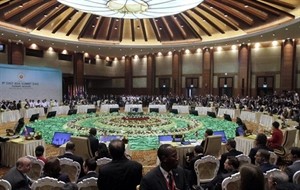
Photo: VNA
(VOVworld) - The Foreign Affairs Committee of the US House of Representatives passed a resolution late Thursday reaffirming the need for a peaceful and collaborative solution to maritime and jurisdictional disputes in the East Sea and East China Sea as provided by universally recognized principles of international law. The chairman of the Committee, Ed Royce, said:
"Resolution 714 rightfully calls for a peaceful resolution of the on-going territorial disputes in the South China Sea. It’s a crucial commercial hub with shipping lines, energy resources, fishing territory. This is a good plan to get it back to a peaceful resolution."
The resolution stated that the maritime domains of the Asia-Pacific region, which include both sea and airspace, are critical to the region's prosperity, stability, and security, including global commerce. In 2002, the Association of Southeast Asian Nations (ASEAN) and China committed to developing an effective Code of Conduct. That declaration committed all parties to those territorial disputes to reaffirm their respect to freedom of navigation in and over the East Sea as provided by the universally recognized principles of international law, and to resolve their territorial and jurisdictional disputes by peaceful means, without resorting to the threat or use of force. Since that time, tensions over disputed maritime and territorial areas have increased. According to the resolution, a Chinese fishing vessel deliberately rammed Japanese Coast Guard patrol boats in September 2010. In February, 2011, a frigate from the People's Liberation Army and Navy (PLAN) fired shots at three fishing boats from the Philippines. In May, 2011, a maritime security vessel from China cut the cables of an exploration ship from Vietnam in the East Sea in waters within the exclusive economic zone of Vietnam. That same month, three Chinese military vessels used guns to threaten the crews of four Vietnamese fishing boats while they were fishing in the waters of the Truong Sa or Spratly Islands. In 2012, the China National Offshore Oil Corporation invited bids for oil exploration in areas within 200 nautical miles of the continental shelf and within the exclusive economic zone of Vietnam. In May, 2014, China's state-owned energy company, CNOOC, anchored its deepwater drilling rig Hai Yang Shi You 981 (HD-981) in Vietnamese waters and deployed over 80 vessels, including seven military vessels, to support its provocative actions and attempt to change the status quo by force.
Without prior consultations with the United States, Japan, the Republic of Korea or other nations of the Asia-Pacific region, China declared an Air Defense Identification Zone (ADIZ) over the East China Sea in November, 2013, with regulations violating the 1994 Chicago Convention on International Civil Aviation. US Congressman Eni F.H. Faleomavaega said: "Although the US government is not a claimant in the maritime disputes in either East China, or South China Sea, the US has an interest in a peaceful diplomatic resolution of disputes claimed in accordance with international law regarding the freedom of navigation and overflight, and a free float for commerce, free coercion, intimidation, or the use of force."
Resolution H.Res. 714, introduced by Congressman Faleomavaega, affirms the strong support of the US Government for freedom of navigation and other internationally lawful uses of sea and airspace in the Asia-Pacific region. It condemns coercive actions or the use of force to impede these freedoms in international maritime domains and airspace.